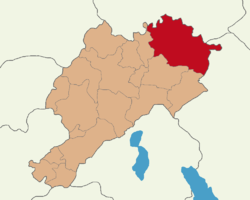Emirdağ
| Emirdağ | |
|---|---|
| City | |

Location of the Emirdağ district in Afyonkarahisar Province
|
|
| Location in Turkey | |
| Coordinates: 39°01′N 31°09′E / 39.017°N 31.150°ECoordinates: 39°01′N 31°09′E / 39.017°N 31.150°E | |
| Country |
|
| Province | Afyonkarahisar |
| Government | |
| • Governor | Mehmet Özel |
| • Mayor | Cengiz Pala (AKP) |
| Area | |
| • District | 2,047.76 km2 (790.64 sq mi) |
| Elevation | 1,100 m (3,600 ft) |
| Population (2012) | |
| • Urban | 19,069 |
| • District | 39,391 |
| • District density | 19/km2 (50/sq mi) |
| Time zone | EET (UTC+2) |
| • Summer (DST) | EEST (UTC+3) |
| Postal code | 03600 |
| Area code(s) | 0272 |
| Vehicle registration | 03 |
| Climate | BSk |
| Website | www |
Emirdağ is a town and district of Afyonkarahisar Province in Turkey, between the city of Afyon and Eskişehir. The district covers an area of 2,009 km², and the population (2014) is 38,269 of which 19,093 live in the town of Emirdağ itself. The mayor is Cengiz Pala (AKP).
The Emir Mountains rise steeply behind the town. The region is vulnerable to earthquakes. The weather is very cold in winter.
The actual name of Emirdağ was Amorion. (Greek: Ἀμόριον) After Arab conquests of Anatolia was the city named as Ammūriye by Arab-Islamic sources. Emirdağ was called after the Ottoman rule as Hergen Kale which refers to the old city outside the town. After 17th century, the city was named as Muslucalı (Which means "From Mosul") due to the mass immigrations of Turkmens from Mosul and Rakka. From 1867 until the foundation of the Turkish Republic, the town was named Azîziyye in honour of Sultan Abdülâziz. After the Turkish war of independence at 1932 the name "Emirdağ" was restored by Mustafa Kemal Atatürk which derives from Seljuk commander Emir Ahmed Mengücek who defeated the Byzantines by the Battle of Bolybotum and rested by the mountain range near the area during the battle, therefore the mountain was named as "Emirdağ".
"Emir" means High officer and "dağ" means mountain.
The area has been occupied since at least 1437 BC by a succession of peoples beginning with Hittites, Lydians, Persians, and Greeks.
...
Wikipedia

